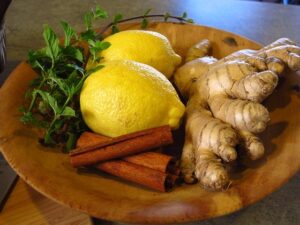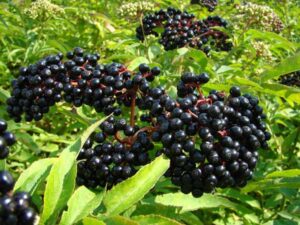
The season of mists and mellow fruitfulness has come round again, the Autumn winds have started to blow again, there’s a slight chill in the air and the children have gone back to school. This is the time of year that we are normally more prone to cold and flu viruses, but clearly this is an extraordinary year and our concern about catching viruses has been with us all year. It’s obvious now to everyone that if our immunity is compromised for any reason, particularly if we have a prior-existing health condition or we are elderly, we are much more likely to succumb to colds and flu viruses. Even if we don’t fit into these groups, our immunity can be lowered by a variety of other factors, particularly related to our lifestyle. These include nutritional deficiencies, physical and emotional stress, drinking too much alcohol, smoking, taking drugs (legal and illegal), eating too much sugar, living in a polluted environment, excessive sugar consumption, staying up too late, not getting enough sleep and working too hard.
The best help we can give ourselves in these troubled times is to work at building a healthy immune system. Start by sticking to the rules of a healthy lifestyle and avoiding things that we know weaken our immunity. We are all aware that it is essential to eat plenty of nutritious, preferably organic food, made up of a high proportion of vegetables, to have a balance of work and play, exercise and relaxation, sufficient sleep, try to minimise pollution in our environment and to develop a positive attitude to dealing with stress and to cultivate practices to engender peace of mind such as being outside in nature, daily meditation and doing a bit of yoga. We may tend to forget however how central digestion is to health – after all the majority of our immune system is found in our gut courtesy of our gut microbiome. The importance of good digestion is one of the central themes in Ayurveda. If our digestive fire or agni is good, the delicious nutritious food that we eat will be well digested and assimilated into our bodies and the residue of food, the wastes remaining to be eliminated, will be minimal. If however our digestive energy is low, our digestive juices and enzymes are not secreted as they should be, and much of what we eat will remain in the gut as partially digested or undigested food, which then ferments and promotes the proliferation of unfriendly microorganisms in the gut and their accompanying toxins which then permeate the body and lower our resistance.
Bearing this in mind, the first steps we can take to enhance our immunity are to improve our digestion and assimilation and combat unfriendly gut flora. Aromatic spices such as ginger, cinnamon, cardamom, coriander, clove, black pepper and asafoetida are some of the best remedies to improve digestion and, with their antimicrobial actions, to help reestablish a balanced gut flora and enhance immunity. These brilliant allies to be found in most kitchen cupboards can be added to your daily diet not only to enliven your culinary skills but also taken as tasty herbal teas.
 Take ginger for instance. Its pungency warms and strengthens the digestion, stimulates the flow of digestive juices and invigorates the whole system. The volatile oils are highly antiseptic, activating immunity and dispelling bacterial and viral infections. Similarly cinnamon is a perfect remedy for warding off the effects of the cold, enhancing digestion and clearing unfriendly microorganisms from the gut. The volatile oil in cinnamon is one of the strongest natural antiseptics known. Its antibacterial, antiviral and antifungal properties make it an excellent medicine to prevent and resolve a whole range of infections. A hot cup of sweet and exquisitely aromatic cinnamon tea with its expectorant and decongestant actions, taken three times a day, will help ward off infections as well as relieve coughs and colds, flu and catarrh.
Take ginger for instance. Its pungency warms and strengthens the digestion, stimulates the flow of digestive juices and invigorates the whole system. The volatile oils are highly antiseptic, activating immunity and dispelling bacterial and viral infections. Similarly cinnamon is a perfect remedy for warding off the effects of the cold, enhancing digestion and clearing unfriendly microorganisms from the gut. The volatile oil in cinnamon is one of the strongest natural antiseptics known. Its antibacterial, antiviral and antifungal properties make it an excellent medicine to prevent and resolve a whole range of infections. A hot cup of sweet and exquisitely aromatic cinnamon tea with its expectorant and decongestant actions, taken three times a day, will help ward off infections as well as relieve coughs and colds, flu and catarrh.
Next have a look at the herbs which have shown a remarkable ability to enhance our own immune mechanisms. Some increase the production and activity of macrophages (cells that the immune system sends to digest foreign invaders), some also stimulate the production of defence substances like interferon, which protect non-infected cells from viruses. Others enhance the production and function of T-cells, vital immune cells that kill viruses, fungi and certain bacteria, and natural killer cells that are responsible for destroying cells already infected with a virus.
Some of the most significant immune enhancers are echinacea (Echinacea angustifolia), golden seal (Hydrastis canadensis), liquorice (Glycyrrhiza glabra) and astragalus (Astragalus membranaceus). Without doubt the most popular immune- boosting herb in this country today is Echinacea. This amazing herb can improve the immune system in many ways including increasing activity of T-cells, interferon and natural killer cells and raising properdin levels. Properdin activates the alternative complement pathway which is responsible for increasing nonspecific host defence mechanisms like neutralisation of viruses, destruction of bacteria and increasing the migration of white blood cells to the areas of infection. As a preventative it can be taken three times a day and at the first signs of acute infections it can be taken every two hours.
The antibiotic activity of goldenseal’s alkaloids against a wide range of infecting organisms including Staphylococcal sp, Streptococcus sp and Diplococcus pneumoniae is well documented. It also has remarkable immuno-stimulatory activity, promoting optimal activity of the spleen and the release of immune-potentiating compounds. One of its alkaloids, berberine, is a potent activator of macrophages, it can reduce virus replication and targets specific interactions between the virus and its host.
Liquorice is particularly useful for treating respiratory tract infections such as pharyngitis, bronchitis, and pneumonia. It has antiviral effects and enhances interferon production. This in turn increases antiviral activity as interferon binds to cell surfaces and stimulates the synthesis of proteins that prevent viral infection.
Astragalus taken regularly as a preventative also boosts resistance to colds, flu and other viruses. It has antiviral and antibacterial properties, stimulates production of interferon and enhances the production of T-cells. You can buy the raw root and add it to soups or casseroles. It does not have a distinctive enough taste to be noticeable. Simmer it for 30 minutes and then remove it. Alternatively it can be bought as a supplement.
The root and bark of the Peruvian rain forest herb una de gato or cat’s claw, which got its name because of its claw-like stems, has been used by the Peruvian Indians for centuries for a range immune problems. It is now a popular remedy here for a whole range of immune problems, including bacterial and viral infections, rheumatoid arthritis, gastric ulcers, colitis, Crohn’s disease, Herpes, Candida and allergies. Cat’s claw is available in health food shops and chemists in tincture and pill form.
But of course you could go out into the hedgerows and benefit not only from some fresh air and exercise but also from some delicious fruits of nature. Elderberries abound in the autumn and are delicious cooked, especially mixed with blackberries and apple. For centuries they have been popular as a flu remedy and more modern research has confirmed that they contain unique compounds that help to prevent flu viruses from penetrating the cell membranes. If this sound preferable to your taste buds than the bitter goldenseal or tongue numbing echinacea, perhaps you might like to make elderberry syrup using 2 cups of elderberries, 500 mls water, ¼ cup of honey and ¼ cup of lemon juice. Cook the berries in the water for a few minutes until they are soft and blend with the honey and lemon juice. Pour the puree into a clean bottle and store in the fridge. Take a tablespoonful in hot water once or twice a day and keep those winter bugs at bay.
Please note that it is important to double check information about these herbs before using them, especially if you are, or are planning to be, pregnant, breastfeeding or on other medication from your doctor.

